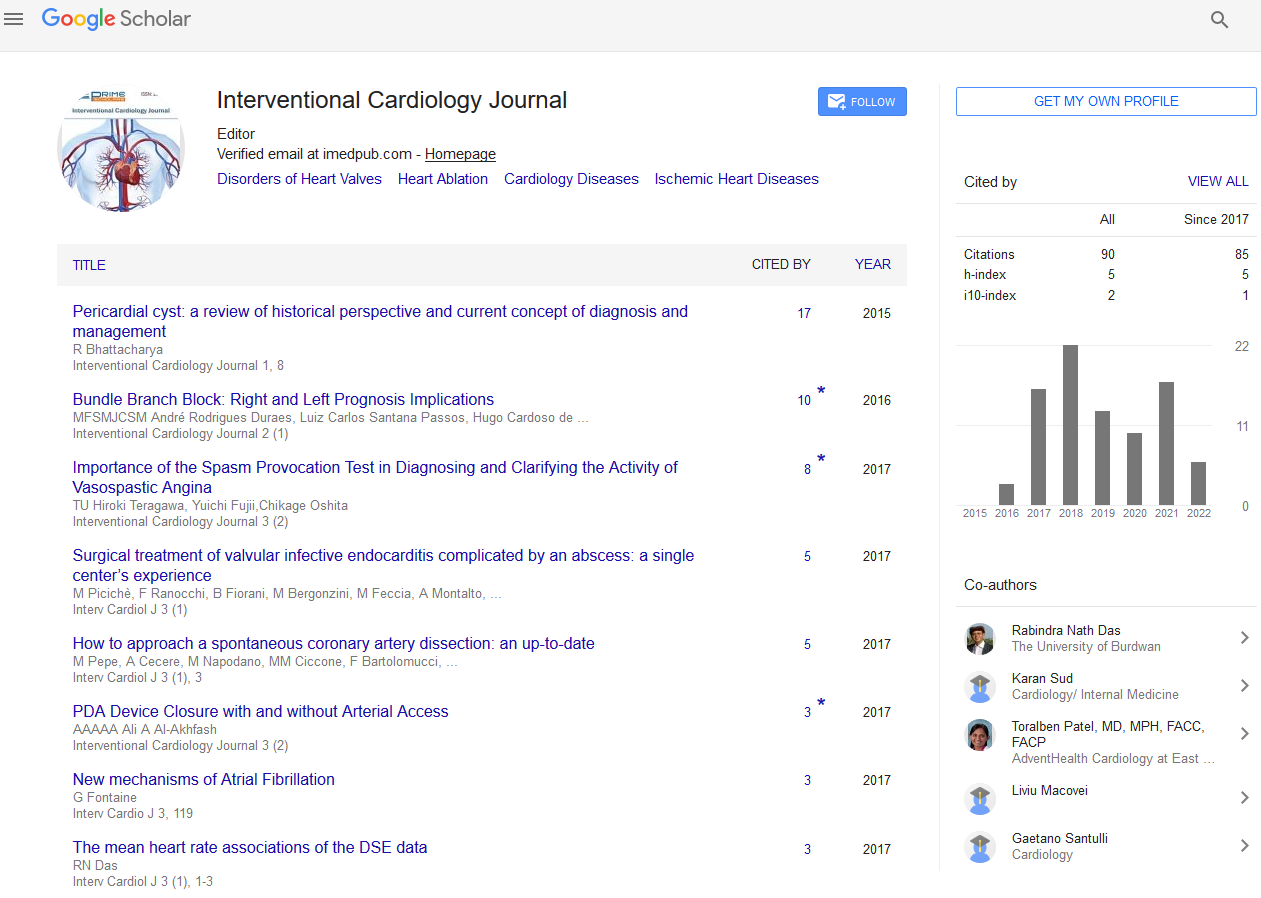Commentary - (2023) Volume 9, Issue 11
Coping with Hypertrophic Cardiomyopathy: Tips and Strategies
Milind Desai*
Department of Cardiovascular Medicine, University of Pennsylvania, USA
*Correspondence:
Milind Desai,
Department of Cardiovascular Medicine, University of Pennsylvania,
USA,
Email:
Received: 30-Oct-2023, Manuscript No. IPIC-23-18481;
Editor assigned: 01-Nov-2023, Pre QC No. IPIC-23-18481 (PQ);
Reviewed: 15-Nov-2023, QC No. IPIC-23-18481;
Revised: 20-Nov-2023, Manuscript No. IPIC-23-18481 (R);
Published:
27-Nov-2023, DOI: 10.21767/2471-8157.9.11.105
Description
The symptoms of hypertrophic cardiomyopathy can vary widely
among individuals and may range from mild to severe. Some
individuals with Hypertrophic Cardiomyopathy (HCM) may
remain asymptomatic, while others experience debilitating
symptoms that significantly affect their quality of life. Dyspnea
(shortness of breath) is a common symptom, often occurring
during physical activity or exertion. Some individuals with HCM
may experience chest pain or discomfort, particularly during
exercise or when the heart is working harder. Many people
with HCM report feelings of tiredness and fatigue, which can
be particularly pronounced during physical activity. Some individuals
with HCM may experience fainting or near-fainting
episodes, especially during exercise or when transitioning from
sitting to standing. Irregular heartbeats, known as palpitations,
can occur in individuals with HCM and may be accompanied
by dizziness or lightheadedness. In rare cases, HCM can lead
to fluid accumulation in the legs and ankles, causing swelling.
It is essential to note that symptoms can evolve and change
over time, and individuals may experience varying degrees of
symptom severity. The presence and severity of symptoms do
not necessarily correlate with the extent of hypertrophy in the
heart muscle. The diagnosis of hypertrophic cardiomyopathy
typically involves a combination of clinical evaluation, medical
history, and diagnostic tests. A detailed medical history is taken
to identify any family history of heart conditions, genetic
mutations, and the presence of symptoms. A physical examination
can reveal signs of HCM, such as a heart murmur, irregular
heartbeat, or characteristic physical features. An echocardiogram
is a primary imaging test used to diagnose HCM. It
provides detailed images of the heart's structure and function,
allowing for the measurement of ventricular wall thickness and
assessment of blood flow. Genetic testing can identify specific
mutations associated with HCM. This can help confirm the diagnosis
and inform genetic counseling for affected individuals
and their families. A Holter monitor is a portable ECG device
worn for an extended period to capture any intermittent arrhythmias
or irregular heartbeats. A stress test evaluates the
heart's response to physical activity and can reveal exercise-induced
symptoms or arrhythmias. In some cases, a cardiac Magnetic
Resonance Imaging (MRI) may be used to obtain more
detailed images of the heart and assess the extent of hypertrophy.
Individuals diagnosed with HCM may benefit from genetic
counseling to understand the genetic basis of the condition
and assess the risk of passing it on to future generations.
It is important to consider that not all individuals with HCM
will have a family history of the condition, and some may not
experience symptoms until later in life. Therefore, it is essential
for healthcare providers to maintain a high index of suspicion
and consider genetic testing and evaluation in individuals with
suggestive symptoms. The treatment of hypertrophic cardiomyopathy
is primarily aimed at alleviating symptoms, reducing
complications, and improving the overall quality of life for individuals
with the condition. The specific treatment plan may
vary based on the severity of symptoms and individual patient
characteristics. Moderate, controlled physical activity is typically
encouraged, while high-intensity or competitive sports may
need to be restricted in some cases. Several medications may
be prescribed to manage HCM-related symptoms, including
beta-blockers, calcium channel blockers, and anti-arrhythmic
drugs. These medications can help control heart rate, reduce
chest pain, and prevent arrhythmias.
Acknowledgement
None.
Conflict Of Interest
The author’s declared that they have no conflict of interest.
Citation: Desai M (2023) Coping with Hypertrophic Cardiomyopathy: Tips and Strategies. Interv Cardiol J. 9:105.
Copyright: © 2023 Desai M. This is an open-access article distributed under the terms of the Creative Commons Attribution License, which permits unrestricted use, distribution, and reproduction in any medium, provided the original author and source are credited.

